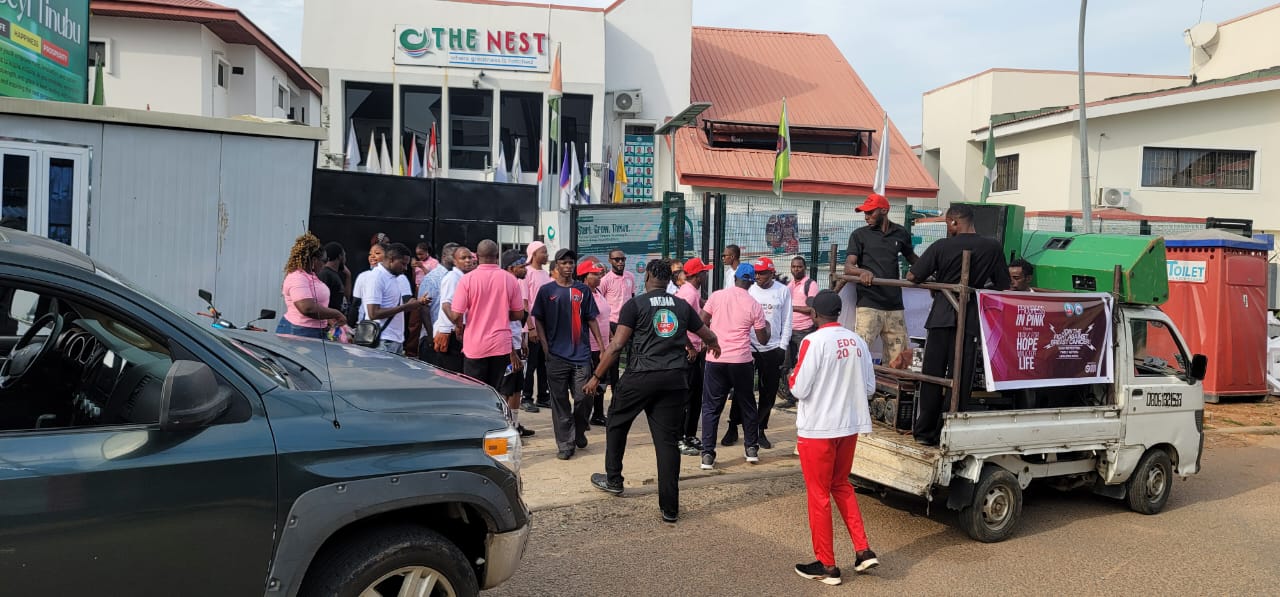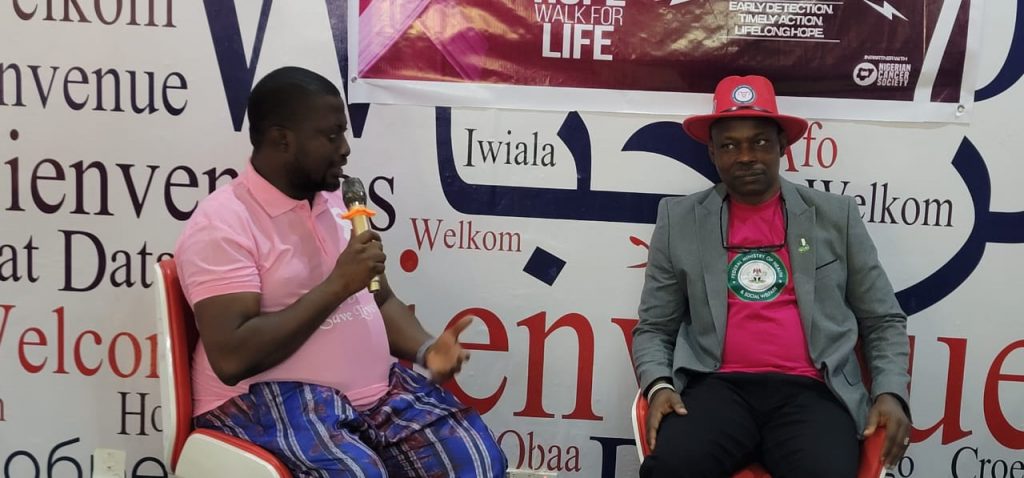Health
APC Youth Leader, Health Minister, Others Champion “Going Pink Walk” for Breast Cancer Awareness in Abuja


Joel Ajayi
It was a vibrant gathering of energetic young men and women across the Federal Capital Territory (FCT) on Saturday in Abuja, as they joined the “Progress in Pink Walk”, a non-competitive awareness march organized by the All-Progressives Congress (APC) Youth Wing to mark Breast Cancer Awareness Month.
The event, themed “Walk for Hope, Walk for Life,” was commenced at The Nest — A Place Where Greatness is Hatched, an over 4 kilometres walk aimed at encouraging early detection, promoting timely medical intervention, and offering hope to those affected by breast cancer.
Leading the walk was the APC National Youth Leader, Dr. Dayo Israel, who has remained consistent in championing initiatives that promote youth empowerment, health consciousness, and community impact.
Over the years, Israel has spearheaded several programs designed to enhance the capacity and wellbeing of young Nigerians.
Globally, October is recognized as Breast Cancer Awareness Month — a period dedicated to increasing awareness, encouraging prevention, and supporting those battling the disease. The APC Youth Wing’s initiative aligns with this global campaign, demonstrating the party’s ongoing commitment to public health advocacy and youth-driven change.
Speaking after the walk, an elated Dr. Dayo Israel explained that the initiative was organized to create awareness among women, both young and old, on the importance of knowing their bodies and seeking medical attention early.
“We want women to know their breasts so well that if anything unusual happens, they act quickly.
“Cancer doesn’t occur overnight it develops over time. awareness, and early detection are key to saving lives,” he said.
He added that the walk also sought to promote fitness as a vital component of a healthy lifestyle and to encourage women to adopt positive habits that support their wellbeing and happiness.
In his remarks, the Minister of State for Health and Social Welfare, Dr. Iziaq Adekunle Salako commended the APC Youth Wing for taking proactive steps to raise awareness about a critical health concern.
“With this step you have taken today, more Nigerians will become aware of the dangers of late detection.
“Unfortunately, eight to nine out of ten breast cancer cases in Nigeria are detected late — a situation we must change through constant awareness and screening,” he said.
He emphasized the importance of prevention, urging Nigerians to take their health seriously through regular check-ups, healthy living, and avoidance of risk factors like smoking.
Also speaking, the President and CEO of the Nigerian Cancer Society, Prof. Abidemi Omonisi, noted that breast cancer remains one of the most prevalent forms of cancer in Nigeria, accounting for up to 40–50% of all cancer cases.
“Breast cancer remains a major public health challenge. Exercise plays a vital role not only in prevention but also in improving outcomes for people living with cancer and other non-communicable diseases such as diabetes and hypertension,” he said.
Prof. Omonisi stressed the need for a community-based response to cancer similar to the national efforts used to combat HIV/AIDS.
“We must involve everyone from schools and youth groups to community organizations to build resilience and eliminate the fear and stigma surrounding cancer,” he added.
He praised the APC Youth Wing for leading the charge, noting that young people, with their creativity and innovation, are uniquely positioned to drive impactful awareness campaigns both online and offline.
The “Progress in Pink Walk” concluded with participants pledging to continue spreading the message of early detection, regular screening, and healthy living underscoring that together, Nigerians can defeat breast cancer through awareness, unity, and action.
Health
Experts call for pharma sector harmonisation

Health sector experts have called for the harmonisation of pharmaceutical activities in Nigeria to eliminate duplication, enhance efficiency, and improve access to quality medicines and health products.
The call was made on Wednesday in Abuja during a high-level stakeholders’ engagement focused on aligning efforts under the Improving Access to Medicines through Policy and Technical Support (IMPACT) project.
Dr Tayo Hamzat, Supply Chain Management Officer at the World Health Organisation (WHO), said the engagement was timely, considering the number of ongoing but uncoordinated interventions in the sector.
“Harmonisation will lead to faster access to health products, lower costs, improved efficiency, and better regulatory oversight.
“It requires collaboration and a focus on strengthening national systems.”
He described Nigeria’s pharmaceutical system as “robust and huge” but hindered by weak coordination and fragmented management structures.
Dr Francis Ohanyido, Director-General of the West Africa Institute of Public Health, said such collaboration was “common sense” given limited development financing and the need to optimise resources.
“Market shaping is a critical tool.
“Harmonisation can help us identify clear gaps we need to fill, especially in preparation for the African Continental Free Trade Area (AfCFTA),” he said.
Dr Anthony Ayeke, Programme Manager for Health and Nutrition at the EU Delegation to Nigeria and ECOWAS, reaffirmed the EU’s commitment to supporting a resilient, locally driven pharmaceutical sector.
“Harmonisation can accelerate local production, reduce import dependency, and improve healthcare system resilience,” he noted.
He also recommended regulatory streamlining, value chain capacity building, innovation, and public-private partnerships.
Dr Abdu Mukhtar, National Coordinator of the Pharmaceutical Value Chain Transformation Committee (PVAC), commended ongoing efforts under the IMPACT project.
Represented by Dr Muhammad Balarabe, Technical Associate at PVAC, he emphasised the committee’s focus on catalysing local production and attracting sustainable investment.
“Let’s use this platform to strengthen partnerships and align interventions with the vision of affordable, high-quality healthcare for all Nigerians,” he said.
Dr Obi Adigwe, Director-General of the National Institute for Pharmaceutical Research and Development (NIPRD), said fragmented interventions and redundant regulations had long stunted growth in the sector.
Represented by Prof. Philip Builders, Professor of Pharmaceutics at NIPRD he said: “Equitable access to quality medicine is the foundation of universal healthcare.
“The lack of access is not just a health issue; it’s about equity, national security, and economic survival.
“Harmonisation isn’t just about avoiding duplication; it’s about aligning policy, investment, and technical frameworks to achieve measurable results.”
He urged stakeholders to develop practical short, medium, and long-term strategies to make Nigeria’s pharmaceutical sector self-reliant, globally competitive, and able to meet national healthcare demands.
The meeting brought together key government agencies, development partners, and private sector actors, each reaffirming a shared commitment to a unified, efficient pharmaceutical ecosystem in Nigeria.
NAN
-

 Featured6 years ago
Featured6 years agoLampard Names New Chelsea Manager
-

 Featured6 years ago
Featured6 years agoFG To Extends Lockdown In FCT, Lagos Ogun states For 7days
-

 Featured6 years ago
Featured6 years agoChildren Custody: Court Adjourns Mike Ezuruonye, Wife’s Case To April 7
-

 Featured6 years ago
Featured6 years agoNYSC Dismisses Report Of DG’s Plan To Islamize Benue Orientation Camp
-

 Featured4 years ago
Featured4 years agoTransfer Saga: How Mikel Obi Refused to compensate me After I Linked Him Worth $4m Deal In Kuwait SC – Okafor
-
Sports3 years ago
TINUBU LAMBAST DELE MOMODU
-

 News10 months ago
News10 months agoZulu to Super Eagles B team, President Tinubu is happy with you
-
Featured6 years ago
Board urges FG to establish one-stop rehabilitation centres in 6 geopolitical zones
